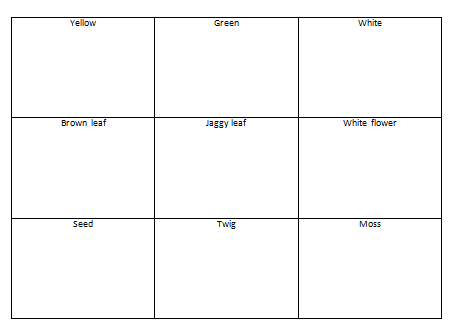On your doorstep
Activity 1
This activity allows pupils to establish that life is all around us, often in unexpected places. It first requires pupils to establish the ‘key characteristics of living things’ using ‘MRS GREN’.
- Discuss characteristics of living things – examples.
- In pairs, walk round the building and grounds looking for examples of each characteristic – note examples in MRS GREN table.
- Note living things in unusual places on the ‘Observation’ table.
- If doing this with a class, you might take photos for later discussion / display.
Activity 2
The idea of this activity is to encourage pupils to observe closely and to begin to think about biodiversity and abundance. It is based on the work of Nicky Souter, Strathclyde University, according to whom, ‘Observation is a significant – arguably the most significant science skill.’ (ASE Scotland Conference, March 2006).
Choose a grassy area for this.
- Working on your own, you have 2 minutes to collect as many different leaves as you can find.
- The person who has found the greatest number of different leaves sets them out in a row. Each person then puts their leaves on top of similar leaves in the row creating piles. The row may be extended for examples not already present.
- Discuss how we could use this activity with a class to begin to establish the concepts of ‘biodiversity’ and ‘abundance’. Could we use it for further observation and identification activities?
Activity 3
Sampling
This can be very simple or can use more involved techniques:
- Simply identifying some habitats within the school grounds and using identification guides to establish what lives there.
- Random sampling of an area using a quadrat.
- Carrying out a line transect using quadrats, then relating abundance and distribution to other factors.
Spot and note evidence of living things – MRS GREN
(Adapted from Science in an Earth Context, Earth Science Education Unit)
| Key characteristic of life | Example | What evidence did you spot? | |
| Movement | · People / animals moving
· Insects / birds flying · Worm paths / casts · Footprints · Plants growing out from walls or other shady spot |
||
| Respiration | · People breathing out water vapour (one of the products of respiration) on a cold day. Take care to get across the concept that respiration is not the same as breathing
|
||
| Sensitivity | to light | · Animals, birds, insects with eyes move without colliding with things
· New shoots grow towards sunlight · Sunflowers turn towards sunlight · Appearance of particular species of flowers at different times |
|
| to sound | · Birds singing
· Dogs barking · What we hear around us |
||
| to smells | · Dogs sniffing lamp-posts
· Insects attracted to flowers · What we can smell around us |
||
| to taste | · People eating
· Wasps attracted to sugar |
||
| to temperature | · People shivering
· Birds with ruffled feathers · Appearance of plant species / mating behaviour of birds and animals in spring. Or, other season related example |
||
| Growth | · Animals or plants which are the same species, but different size due to differences in growth. | ||
| Reproduction | · Pregnant mother
· Spring lambs · Flowers, berries and other fruits, seeds. · Saplings |
||
| Excretion | · Toilet block
· Droppings |
||
| Nutrition | · Birds and other animals foraging
· Animals grazing · Worm casts · Someone eating · Green leaves |
||


